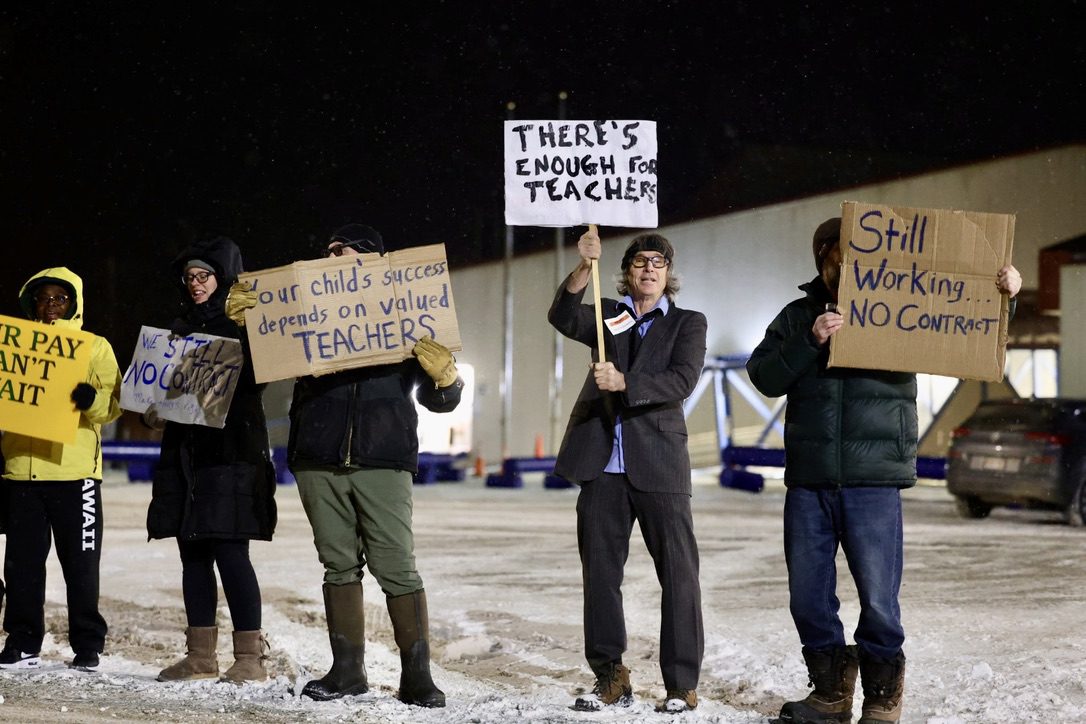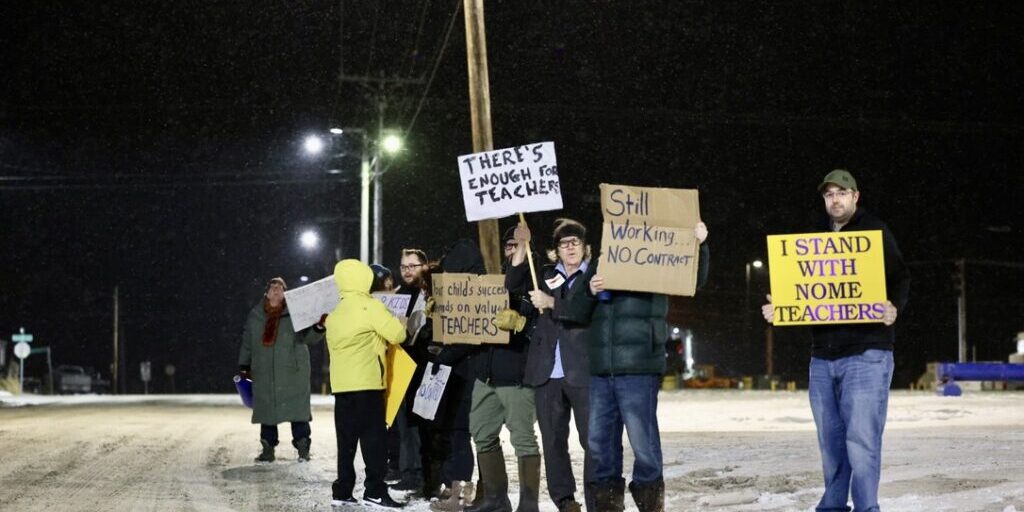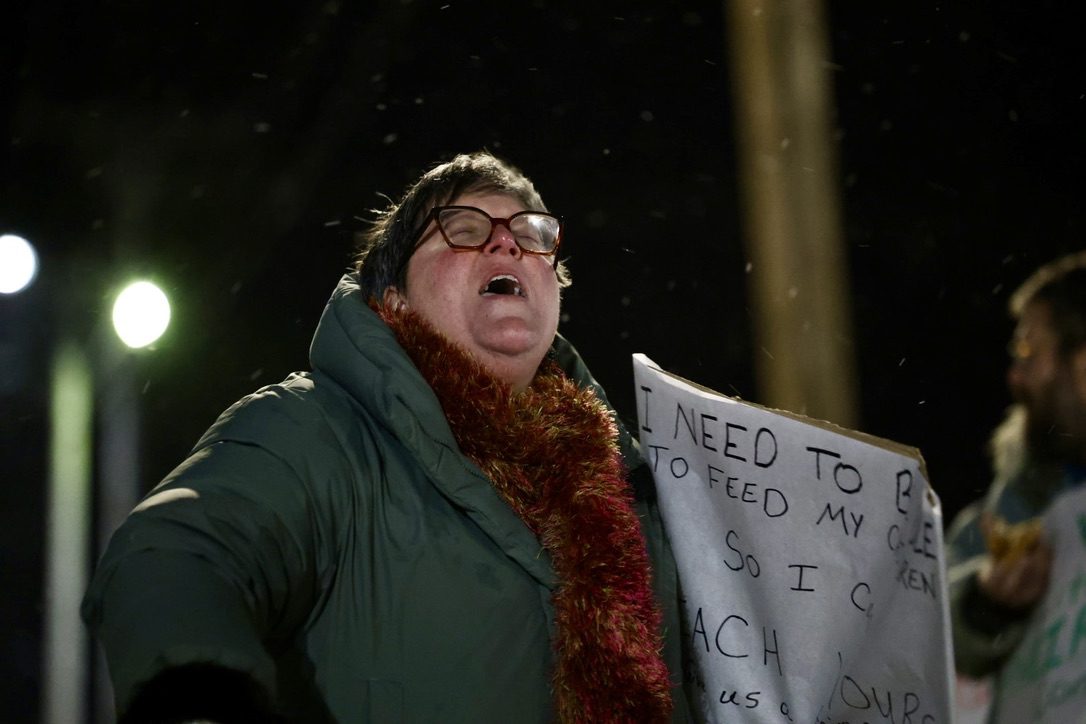Cars honked as a group of over 30 teachers and supporters lined East K Street in front of Nome Elementary School (NES).
“What disgusting? Union busting! What’s outrageous? Teacher wages!” the group, led by Jill Peters, shouted into the below-freezing Nome air.
As the group chanted, they shook homemade signs with messages like “Our Students ARE WORTH IT” and “FAIR PAY CAN’T WAIT”.
Nome-Beltz Middle High School (NBHS) Principal Teriscovkya Smith delivered baked goods and NES Principal Nicholas Settle hand-poured hot coffee into cups.
Peters said teachers at Nome Public Schools (NPS) began the new school year without a contract in good faith, something she said is not typical. As the school year enters its second quarter, she said it's time to make more noise about the ongoing negotiations.
“Every day that we go to our job is a day that we choose not to have higher wages at a different job in this town. We need to be able to feed our kids so that we can continue to teach yours in this community.”
- Jill Peters
Peters said employers like Norton Sound Health Corporation (NSHC) and Kawerak, Inc paying livable wages makes it harder for the schools to retain qualified teachers. While NPS employees may pay as little as $700 a month to stay in housing owned by the district, employers like NSHC recently began offering a $1,500 a month stipend for all Nome-based employees.
She said teachers want to stay in Nome, but costs of living up to 42% higher than the national average have made it difficult.
"What I am tired of after 11 years is the revolving door of teachers that come in and out and in and out. They love this community, but they can't afford to live here," Peters said.
The Nome Education Association is set to return to the bargaining table with NPS in early November. Due to the ongoing nature of the negotiations, representatives of the union were unable to confirm specific demands. They did however confirm that case load and teacher safety were also being considered, in addition to calls for increased wages.
Show me the money

Signs like “THERE’S ENOUGH FOR TEACHERS” beg the question, where should the money for increased wages come from?
NPS was the benefactor of an increase to the Base Student Allotment (BSA) included in the State of Alaska’s FY25 budget. The BSA is multiplied by the district’s “Average Daily Membership” to determine how much funding it receives from the state each year.
Governor Mike Dunleavy initially vetoed a bill raising the BSA earlier this year citing an absence of educational reforms in the bill. He later approved a $680 increase with the signing of the state’s 2025 budget.
The second-term governor, who is eyeing a spot in former President Donald Trump’s cabinet if elected, vetoed tens of millions of dollars in other education-related expenses while doing so.
The $680 increase to the BSA is certainly welcomed, but is half of a $1,348 increase the Alaska Legislative Budget and Audit Committee suggested in 2023. The committee calculated the figure at the request of Senator Löki Tobin and used the same annual inflation rates the Alaska Permanent Fund uses.
NPS also received $3.4 million from the City of Nome, an increase of $200,000 from the previous year’s contribution. The increase in funding comes as the city faces a $2.4 million annual shortfall.
NPS also expects to receive $2,741,798 in federal funding.
Expenses
According to NPS’ FY25 budget approved earlier this year, labor costs account for the vast majority of their budget.
Approximately 69% of the $17,783,791 budget is expected to go towards costs related to instruction including salaries, benefits, and supplies. Administrative costs are expected to total 9% of the budget and 19% is allocated to maintenance and operations expenses.

The FY25 budget called for 35.75 full-time-equivalent (FTE) certified teachers working in regular instruction across NPS’ three campuses. At a projected total salary expense of $2,933,721, the average full-time teacher salary was $82,062.
Across NPS’ three campuses, certified special education teachers earned slightly less with an average salary of $77,737. These salary figures do not include insurance, retirement contributions, and other benefits nor does it include staff shared by multiple campuses.
Salaries for non-certified staff like aides and support roles had averages in the $40,000s.
A full copy of Nome Public Schools’ FY25 budget can be accessed here.







